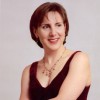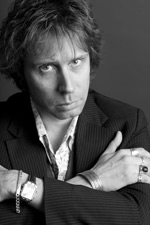It’s the final movement of Mahler’s fourth symphony, the last in the composer’s folk poetry-inspired “Wunderhorn” series. By this point, the work—performed this Easter afternoon by the Bard College Conservatory Orchestra under Leon Botstein—has already traveled from the blooming, budlike innocence of the sleighbells that open its first movement and through the devilish “death dance” scherzo and funereal procession of, respectively, its second and third. As the music bucolicly reawakens and starts to swell to peaks of Earth-shattering triumphance, matching the glorious weather outside the shimmering Fisher Center, soprano Dawn Upshaw is about to make her own ascension.
Standing center stage, resplendent in a full-length red silk coat, Upshaw begins to sing “Das himmlische Leben,” the song from which the whole of the symphony springs. Eyes closed, blissfully lost in the strings, tympani, and woodwinds behind her, she delivers, in the original German, the piece’s idyllic, childlike impressions of a saintly feast. As her voice rises to soar above the crescendo, it fills the cavernous hall and pierces the towering ceiling, on its way to heaven itself. Language barrier be damned, the sheer delight of the song’s fairytale imagery—as well as the pleasure and privilege the singer derives from performing it—is unmistakable, intoxicating, liberating. As per her reputation, Upshaw is clearly feeling the text, connecting with the composer’s intended emotion and allowing it to flow through her singularly divine instrument. At the close of the recital the audience is on its feet, its applause thunderous. Repeated shouts of “Bravo!” puncture the mounting din. When the diva returns with the student orchestra for a bow, a colorful bouquet is placed in her outstretched arms. She’s beaming. Spring is clearly in the air, and one can’t help but feel Upshaw helped put it there.
“The orchestra did such a beautiful job,” Upshaw says the following evening, characteristically downplaying her own role and gushing with pride in the students. “To stand with young people playing a masterpiece like that for the first time on stage is just extraordinary, to experience the joy they’re feeling. But I do love singing Mahler’s fourth. I also recently performed it with David Zinman and the [Zurich-based] Tonehalle Orchestra, and I did it a lot at the beginning of my career.”
And for a singer’s career, Upshaw’s is as breathtaking as they come—so take a deep one: Since her professional start with the Metropolitan Opera in 1984 she’s made nearly 300 appearances with the company; has performed in innumerable acclaimed recitals and in leading opera roles across Europe and the US, including several at Carnegie Hall; and collaborated with the Kronos Quartet, Met director James Levine, conductor Sir Simon Rattle, conductor-composer Esa-Pekka Salonen, and pianist Richard Goode. She’s had numerous operas created specifically for her, such as John Harbison’s “The Great Gatsby,” John Adams’s “El Niño,” and Kaija Saariaho’s Grawmeyer Award-winning “La Passion de Simone.” She was a guest of President Bill Clinton and Mrs. Clinton on NBC’s “Christmas at the White House” and was named a Fellow of the American Academy of Arts and Sciences in 2008. Known for her championing of works by contemporary composers like Luciano Berio, George Crumb, Osvaldo Golijov, and others, she is also a four-time Grammy winner who has appeared on over 50 recordings, including Henryk Gorecki’s million-selling Symphony of Sorrowful Songs (1993, Nonesuch Records).
So obviously, then, her becoming a world-renowned soprano can only be the grand fulfillment of a lifelong mission. She must’ve been drawn to classical music at an early age, been groomed for the position like some thoroughbred Russian athlete. “Not at all!” says a bemused Upshaw, who was raised in the Chicago suburb of Park Forest, Illinois. “I grew up with folk music. My father played guitar and sang, and both my parents were active in the civil rights movement. We sang Bob Dylan and Pete Seeger songs, marched, organized community events. I didn’t want to have anything to do with classical music or opera. It was stiff museum music to me, until I really realized what the music was capable of expressing emotionally. Which was around the time I’d really started studying.”
Her studies began with high school singing, and were followed by her graduating from Illinois Wesleyan University in 1982, which led her to the Manhattan School of Music, where she studied under Ellen Faull. Further courses with Jan DeGaetani at Colorado’s Aspen School of Music cemented her passion for modern composers, and her grand arrival ultimately came with the winning of 1984’s Young Concert Artist Auditions and a subsequent invitation by James Levine to join the Metropolitan Opera Studio. “[The invite] was like a golden egg dropping in my lap,” recalls the singer, who also won the prestigious Walter M. Naumberg Competition the following year.
After a few minor operatic roles, she gave her first professional recital at Lincoln Center’s Alice Tully Hall (where the aforementioned Bard concert was reprised on April 10), which brought unanimous raves from critics and concertgoers alike. From there her star turns in major operas came with blinding speed: Ann Truelove in Stravinsky’s “The Rake’s Progress,” Mélisande in Debussy’s “Pelléas et Mélisande,” both Blanche and Constance in Poulenc’s “Dialogues des Carmelites,” the Angel in Messiaen’s “St. Francoise d’Assise,” and many others. Exalted for her Mozart renditions, Upshaw, 48, is also one of the few artists to have performed the leading roles in all the composer’s foremost operas: Pamina in “The Magic Flute,” Ilia in “Idomeneo,” Susanna in “The Marriage of Figaro,” and Despina in “Cosi fan tutte.”
In recent years, however, Upshaw has backed away from opera. “I don’t really think of myself primarly as an opera singer,” she says. “In any given season now, when I’m singing it’s more recitals or chamber pieces. Opera is much more consuming than I can handle these days—I have a family with two kids, one in high school and the other in college. And then there’s the teaching.”
The teaching. In addition to serving on the faculty of Tanglewood Music Center, Upshaw is artistic director of Bard’s esteemed Graduate Vocal Arts Program, a curriculum the institution tapped her to design and conceive in 2006 and from which she plainly gets unbounded satisfaction. “I’m supposed to be teaching [the students], but so much of the time they inspire me,” Upshaw says. “To work with a young singer who isn’t jaded, who comes to the music with awe and respect and the desire to express his or her self is just a stunning experience. It makes me value things that I hadn’t valued before, and reminds me of why I became a singer in the first place.”
“[Upshaw] is very warm, very direct, as a teacher, which is unusually wonderful,” says Mary Bonhag, a second-year student soprano. “I feel very blessed to study with someone who’s such an international success but who’s also so clearly present in her teaching.”
Likewise enamored is Leon Botstein, Bard’s president and the principal conductor and music director of the American Symphony and Jerusalem Symphony orchestras. “We’re extremely fortunate to have Dawn, one of the most important and spectacular sopranos of her generation, working with our graduate vocal arts students,” Botstein says. “Her design for the program was visionary, and her ongoing dedication to her students is unmatched. In addition, we all have the great pleasure of working with her and hearing her sing on a regular basis.”
But despite the glorious heights she’s reached in both the concert hall and the classroom, Upshaw was dealt a trying blow in 2006 when she was diagnosed with early stage breast cancer. “That certainly put things in perspective,” recalls the singer, who was treated for the disease and is now in remission. “It was a crazy time but it was also good in a sense, because it made me look twice at the day-to-day choices I was making.” The following year, however, she was catapulted back above the stratosphere when she received a MacArthur Foundation fellowship, making her the first vocal artist to attain the organization’s vaunted “genius grant.” Vindication, perhaps?
“That’s interesting, I hadn’t really thought of it like that,” Upshaw ponders. “I don’t really think of those two things together, but I see what you mean. [The MacArthur grant] was certainly a wonderful thing to receive—especially after all of that with the cancer, you’re right. It was an incredibly deep, very meaningful gesture, and I’m very honored that the foundation picked me.”
What does she say to listeners—especially the pop-loving younger ones—who hold the view about the classical repertoire that she herself once held, that it’s merely “stiff museum music”? “I’d ask them to leave themselves open to being moved by something they may not think could move them, to allow themselves to be enlightened,” says Upshaw. “I get that from listening to Miles Davis or Steely Dan, and I also get it from listening to Mahler. I want people to feel connected to each other through this music—to feel moved, feel something greater that ultimately changes them like it changed me. To reach that level of transcendence.”








